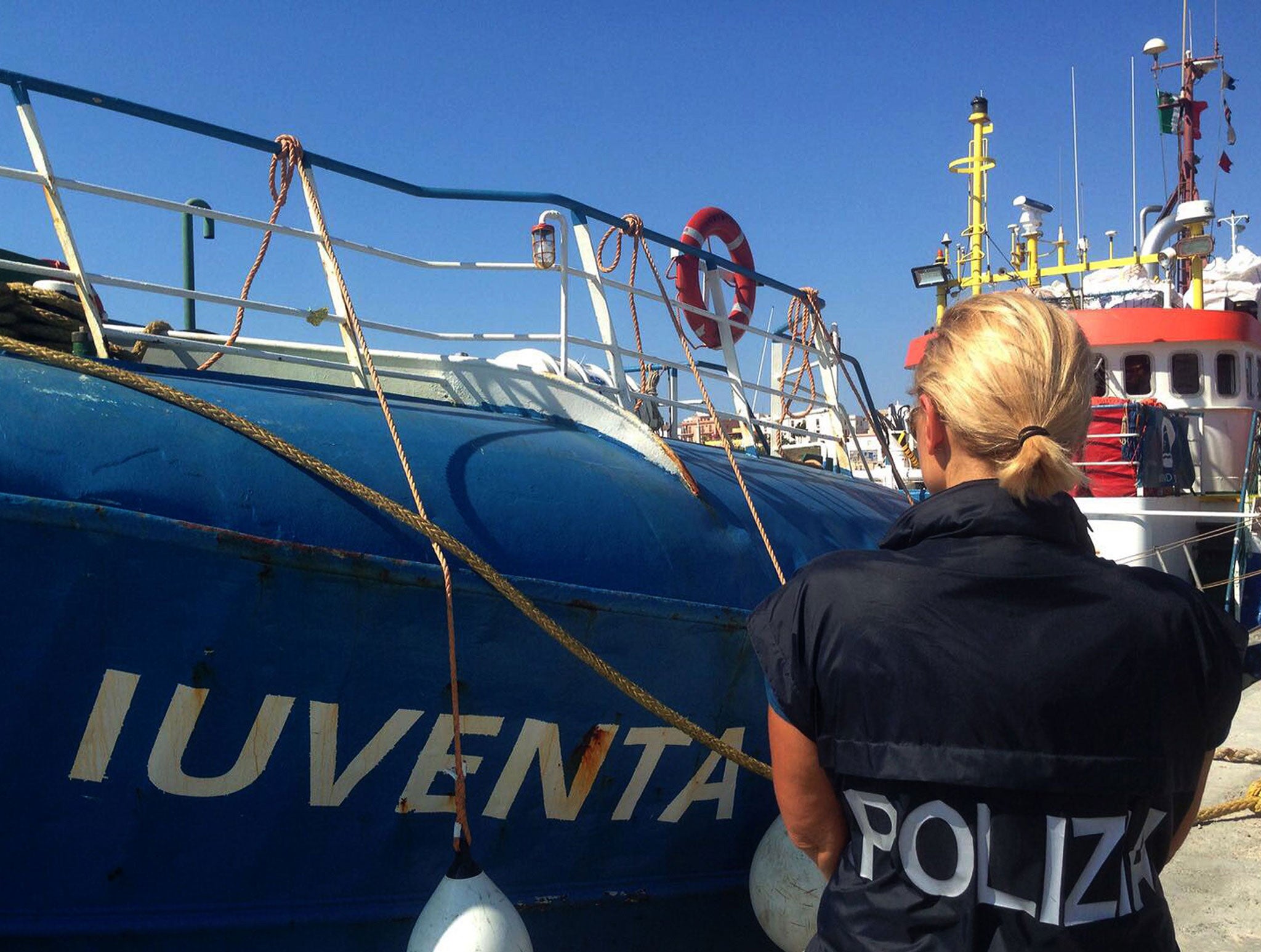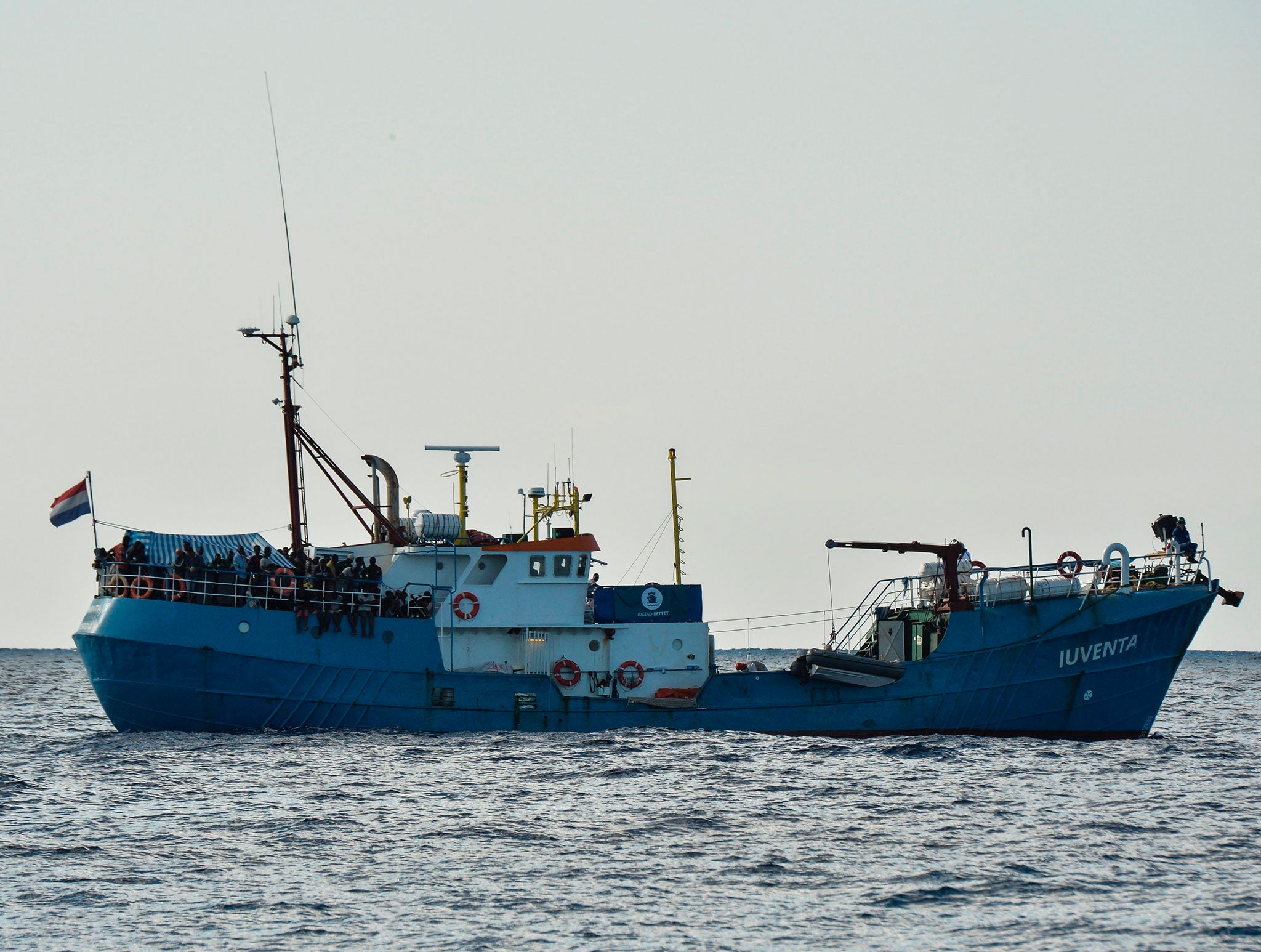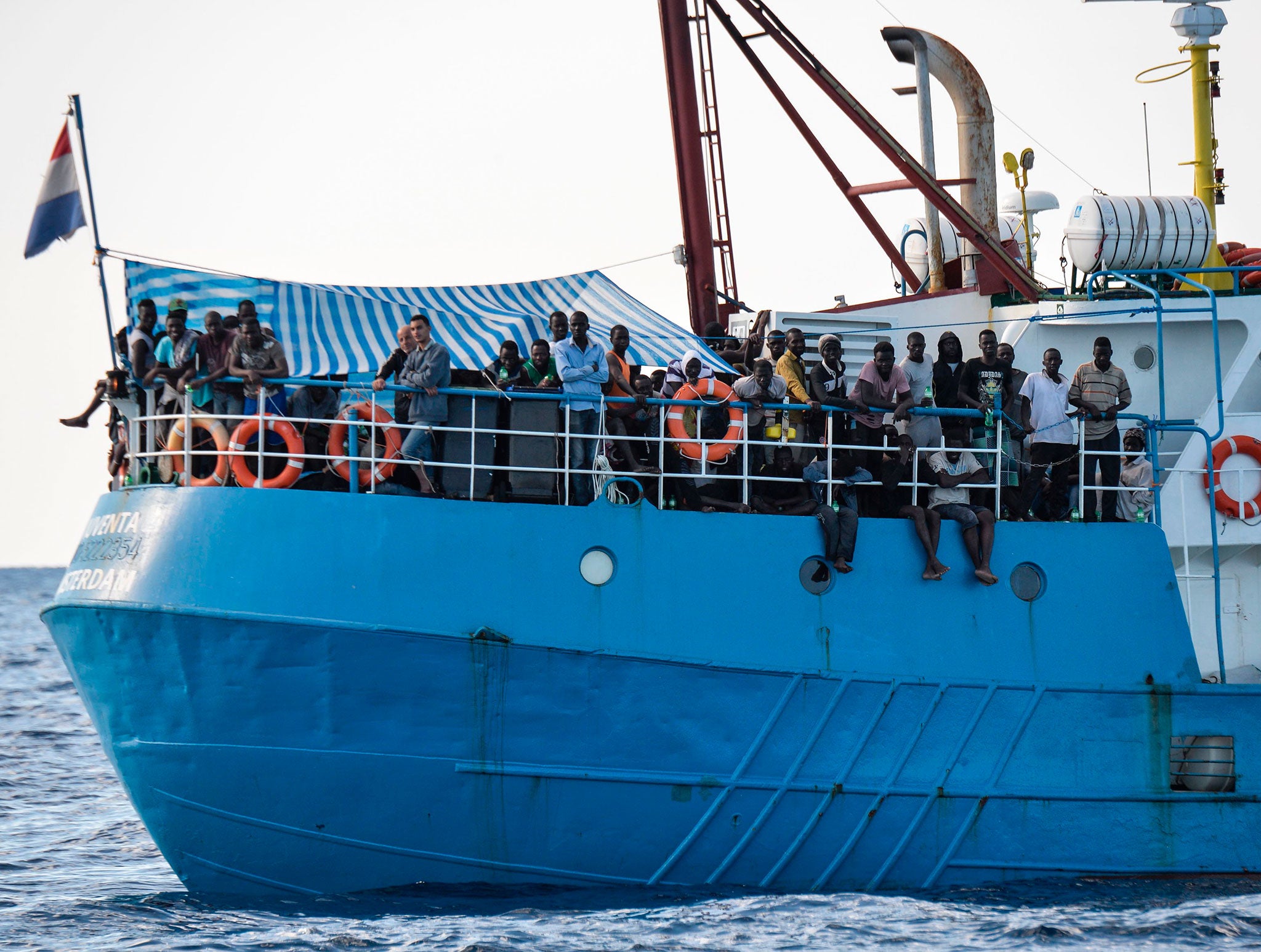Italy seizes refugee rescue ship accused of having contact with Libyan smugglers
Prosecutor says NGO did not take money and claims of a coordinated plan between charities and Libyan smugglers are ‘fantasy’

Italian authorities have seized a refugee rescue ship operated by a German charity over allegations volunteers had contact with Libyan smugglers.
Prosecutors in Trapani said an investigation started in October had uncovered evidence suggesting that the Iuventa was used “to aid and abet illegal immigration”.
The vessel, operated by Jugend Rettet, was seized on the island of Lampedusa on Wednesday after it was ordered to take rescued migrants to shore there and its crew have been interviewed by police.
Ambrogio Cartosio, a public prosecutor from Trapani, said there was evidence some members had contact with smugglers during one incident in September and two others in June.
“There were contacts, meetings, understandings,” between the group’s boat and the smugglers, he said.
The prosecutor alleged that migrants were “handed over” to the Iuventa by smugglers rather than being “rescued”, and later transferred to other ships to be taken ashore in Italy.
“The evidence is serious,” Mr Cartosio said. “We have evidence of encounters between traffickers, who escorted illegal immigrants to the Iuventa, and members of the boat’s crew.”

But the prosecutor stressed that there was no evidence of Jugend Rettet receiving any money from Libyan traffickers and no indication of a wider conspiracy between the two groups – a favourite theory of the European far-right.
“My personal conviction was that the motive is humanitarian, exclusively humanitarian,” Mr Cartosio said.
“It would be fantasy to say there was a coordinated plan between the NGOs and the Libyan traffickers.”
Images released by Italian police appeared to show a RIB from the Iuventa towing an empty wooden boat into Libyan waters on 18 June, with volunteers later coming in close proximity to a boat containing smugglers removing the engine from a dinghy packed with migrants.
Smugglers were again filmed in close proximity to the Iuventa on 26 June as part of the Italian investigation.
Jugend Rettet, which has refused to sign a controversial code of conduct for rescue ships, said it sailed to Lampedusa under instruction from Italian authorities after rescuing migrants from a boat in distress.
“As it happened during other stops at this port, the crew was questioned by the local police, which also entered the ship,” it said in a statement.
Police searched the ship under warrant as soon as it docked and checked the crew’s passports, later taking charge of the boat to sail it to Sicily.

Representatives of Jugend Rettet could not be reached for comment, but in a statement posted on Twitter, the German charity said it had received no information about the investigation.
“For us, the rescue of human life is and will be a top priority, so we are very sorry that we are not able to operate in the search and rescue zone at the moment,” a spokesperson said.
“We can only assess all the accusations currently being made after we have collected all the information to assess the situation.”
It was the first time Italian police have seized a humanitarian boat, following months of mounting tensions over claims NGOs are aiding or even directly colluding with Libyan smugglers.
NGOs have been appearing before an Italian parliamentary committee looking into allegations of collusion, where Mr Cartosio announced his suspicions in May and said some rescuers appeared to know where to locate migrant boats in advance.
Charities have repeatedly rejected the charges, saying they are deployed by the Rome-based Maritime Rescue Coordination Centre (MRCC) to aid in the search and rescue zone in international waters off Libya.
The suspicions resulted in Italy drawing up a “code of conduct” for humanitarian ships, but only three of the eight organisations active in the central Mediterranean have so far signed it.
Objections shared with large international charities, such as Médecins Sans Frontières (MSF), included fears that armed military or police personnel would come aboard the NGO vessels, compromising the groups’ humanitarian missions, and that a ban on transferring migrants at sea would delay rescues.
Jugend Rettet and other groups said they were open to further negotiation and would continue to coordinate with the MRCC in Rome and in accordance with international and maritime law.
Humanitarian groups argue the EU has failed to provide sufficient rescue assets on the deadly crossing between Libya and Italy, where NGOs have completed 35 per cent of rescues so far this year.
Almost 2,400 men, women and children have died attempting the journey in 2017, with the bodies of another five men and three women being pulled from the water by MSF as the Iuventa was being seized on Wednesday.
More than 95,000 migrants have been taken ashore in Italy in the same period, mainly from Nigeria, Bangladesh and sub-Saharan African nations, while sea crossings to Greece have slowed to a trickle since the EU-Turkey deal was imposed last year.
Analysis of radar data shows that most boats are launched from known smuggling hubs in western Libya, with rescues moving closer and closer to the coast over the past three years as smugglers have switched from large wooden vessels and cargo ships to flimsy dinghies.
The EU border agency, Frontex, blamed rising deaths mainly on “ruthless” smugglers but argued that search and rescue missions are influencing their activity and “acting as a pull factor” for migrants.

“All parties involved in search operations in the central Mediterranean unintentionally help criminals achieve their objectives at minimum cost, strengthen their business model by increasing the chances of success,” said a report released earlier this year.
But a recent House of Lords report said the deadly shift to dinghies was partly caused by the EU destroying vessels as part of its anti-smuggling Operation Sophia mission, which was branded a failure.
The report warned of “serious abuses” against migrants by the UK-trained Libyan coastguard, which is accused of beating, shooting and killing asylum seekers and has attacked NGO ships.
The UN has also warned of grave abuses in war-torn Libya, where people smuggling has become a lucrative trade operated by armed gangs known to kidnap, ransom and torture migrants, or to force them into labour to be bought and sold in “slave markets”.
The ongoing violence and lawlessness, has not deterred European efforts spearheaded by Libya’s former colonial ruler Italy to transfer responsibility for refugee “rescues” to the fragile Government of National Accord (GNA) – one of two rival governments vying for power in the country.
As politicians seek to assuage voters angered by hundreds of thousands of migrants stranded in Italy, the country’s parliament approved sending Italian naval vessels to bolster the Libyan coastguard’s patrols aiming to stop boats being launched.
The GNA said it had requested the move but its Tobruk-based rival government has opposed it as a “violation to the sovereignty of Libya”.
Field Marshal Khalifa Haftar, an ally of Russia heading the Tobruk government’s army, has ordered naval forces to confront any vessel entering the country’s territorial waters without military permission, raising fears of direct conflict with Italy.
Additional reporting by agencies
Join our commenting forum
Join thought-provoking conversations, follow other Independent readers and see their replies
Comments
Bookmark popover
Removed from bookmarks